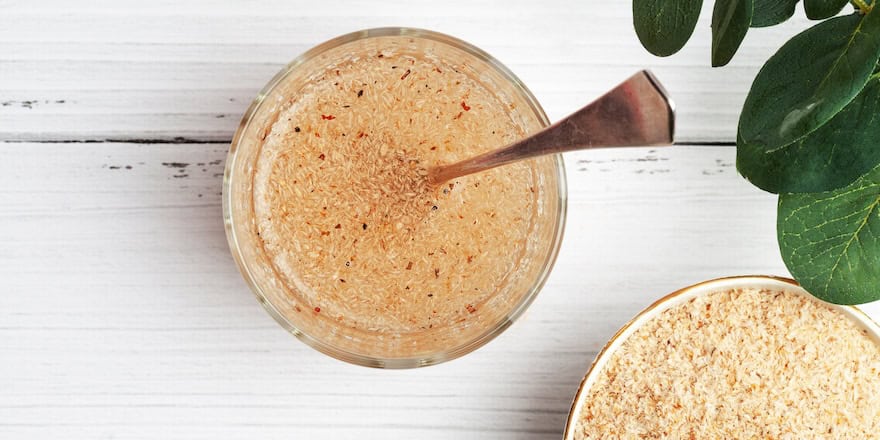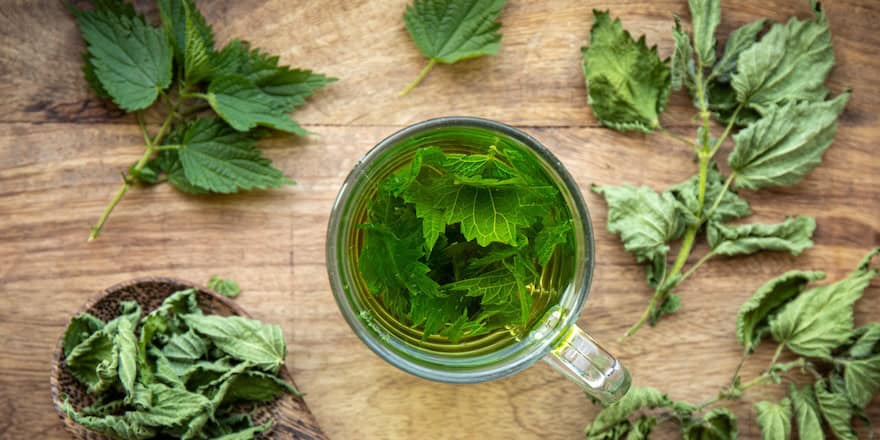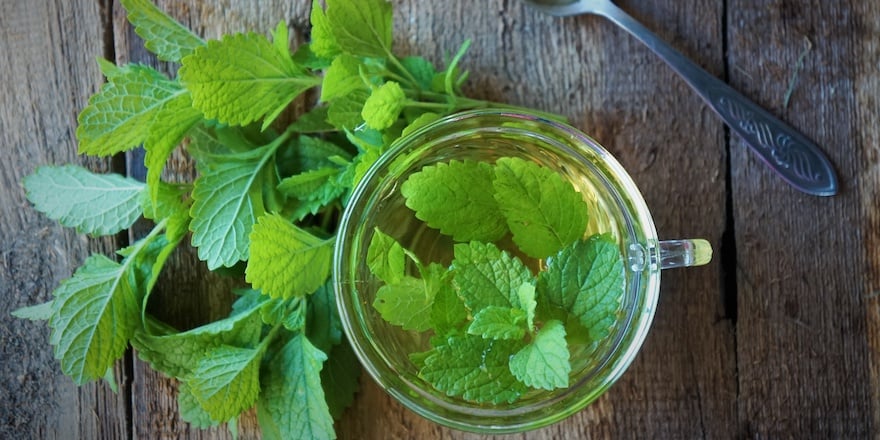Whether in leaves, flowers, roots, or seeds, medicinal plants can support gently and without fear the mother throughout her pregnancy. I will guide you to find the herbal tea that suits you best.
Contrary to what you might think, some herbal teas are permitted during pregnancy and can help manage minor issues such as nausea, gastroesophageal reflux, constipation, fatigue, and stress.
It is obviously best to favor medicinal plants from organic, French agriculture to ensure optimal quality and results. Indeed, France is a major producer of medicinal plants. Here is my selection of the 6 best herbal teas for pregnancy.
📚 Read also | Best dietary supplements for pregnancy: a pharmacist’s opinion
1. Ginger tea for nausea

It is very common that during the first weeks of pregnancy (from 4th-6th weeks’ gestation), pregnant women experience nausea, and even vomiting. For some women, this nausea can be very uncomfortable.
The rhizomes of ginger (Zingiber officinale), with antiemetic and anti-nausea properties, are recommended to ease these symptoms, as shown by numerous studies and in particular this one.
The specific use in pregnant women is, moreover, endorsed by the WHO starting at 250 mg of dried ginger, as a decoction, 4 times a day.
For practical reasons, I recommend preparing 1 L in the morning and drinking it slowly throughout the day. For 1 L, use 1 g of dried rhizomes, to steep for at least 15–20 minutes in very hot water.
Note that for fresh ginger, count on 10 g per 1 L per day.
In addition to ginger, you can implement other tips to soothe the symptoms. For example, eat smaller, more frequent meals, avoid foods that are too fatty or too sweet and favor semi-liquid foods (soup, purée, broth, yogurt…). These allow for rapid digestive absorption.
2. Wild mallow tea for gastroesophageal reflux

Often appearing at the end of pregnancy, heartburn related to gastroesophageal reflux can be very troublesome for the mother.
The flowers of wild mallow (Malva sylvestris), with soothing and anti-inflammatory properties, help coat the lining of the stomach and the esophagus. They therefore reduce burning sensations, as shown by this study.
You can prepare 1L of herbal tea in the morning and drink the equivalent of one cup after meals. In general I advise my clients to let steep for at least 15 minutes: 4 tablespoons of wild mallow flowers per 1L of hot water. The water turns a beautiful azure blue. You’ll see, it’s magical!
In addition to the infusion, I encourage mothers to put in place some basic hygiene and dietary measures. Avoid spicy foods, fried foods, coffee, tea, and carbonated drinks. Eating smaller, more frequent meals and not lying down immediately after dinner can also delay the onset of symptoms.
3. Psyllium tea for constipation

The seeds of plantain psyllium or blond plantain (Plantago ovata) are traditionally used to manage constipation in pregnant women. Rich in mucilage, psyllium seeds help soften stools and promote the passage of bowel contents.
Mucilages are molecules that, when they come into contact with water and mucous membranes, allow a gel to form. This gel lines the walls of the intestine and helps food move through.
I recommend drinking plenty of fluids to facilitate the action of psyllium.
How to prepare your herbal tea? Take the equivalent of 25 to 30 g of psyllium seeds per day, divided into 2 to 3 doses after meals. For one cup of hot water, add 10 g of seeds that have been previously ground, let it steep for about twenty minutes, and sip your tea slowly.
📚 Read also | Our tips for choosing the right psyllium
4. Stinging nettle leaf tea to reduce fatigue

The stinging nettle (Urtica dioica), as its Latin name indicates, is known for its stinging properties. That is, it causes itching when you touch its leaves. Yet it is one of the most beneficial medicinal plants. It’s also one of my favorite plants!
It contains almost all the essential amino acids. As well as large amounts of:
- Vitamins C, A, E, B1, B2, B3, B6
- Iron
- Calcium
- Phosphorus
- Manganese
- Magnesium
- Potassium
- Copper
This gives it numerous medicinal properties: remineralizing, anti-anemic, antioxidant, immune-stimulating, anti-inflammatory…
Its richness in trace elements makes it the go-to plant for managing fatigue in pregnant women. Plan on at least 3 cups of nettle leaf tea per day for 20 days.
Bonus: as this study shows, in cases of postpartum hemorrhage, it is recommended as a course of at least one month to address iron deficiency and fatigue.
5. Lemon balm infusion for stress relief

The subtly lemony flavor of lemon balm (Melissa officinalis) makes it one of the most popular medicinal herbs for herbal tea.
Its leaves are traditionally used for relief of mild stress symptoms and to promote sleep.
It is recommended throughout the day and at bedtime. Its effect is fairly mild and does not cause drowsiness or pose a risk to the fetus, as indicated by this study.
Use 1 tablespoon of leaves per 33 cL (330 mL) cup of hot water. Be careful not to use boiling water and make sure to properly cover the infusion! Lemon balm leaves are sensitive to heat.
6. Raspberry leaf tea to support labor

If there is one medicinal plant truly dedicated to women, it is indeed the raspberry plant. From first periods to menopause, raspberry leaves are used for their antispasmodic properties to relieve menstrual cramps.
Mais surtout dès la fin de la grossesse, à partir de la 36ème semaine d’aménorrhées, pour faciliter le travail et éviter l’utilisation de forceps comme le montre cette étude.
Pour une efficacité optimale, je recommande de boire entre 1L et 1,5L de tisane de feuilles de Framboisier par jour. Il faut compter généralement 4 cuillères à soupe de feuilles pour 1L de tisane.
Sources and scientific studies
Anadol, E., Demirel, M., Süntar, İ., Gültekin, S., et al. Investigation of the Effect of Melissa officinalis L. on Fetal Development by Ultrasonography in Rats. Journal of Gazi University Health Sciences Institute, 2023
European Union herbal monograph on Malva sylvestris L., flos EMA/HMPC/749511/2016
Community herbal monograph on Melissa officinalis L., folium EMA/HMPC/196745/2012
Community herbal monograph on Plantago ovata Forssk., seminis tegumentum EMA/HMPC/199774/2012
Gasparetto JC, Martins CA, Hayashi SS, Otuky MF, Pontarolo R. Ethnobotanical and scientific aspects of Malva sylvestris L.: a millennial herbal medicine. J Pharm Pharmacol. 2012
Heitmann K, Nordeng H, Holst L. Safety of ginger use in pregnancy: results from a large population-based cohort study. Eur J Clin Pharmacol. 2013
Mashhad, Iranian Journal of Obstetrics, Gynecology and Infertility, Mashhad University of Medical Sciences, The effect of Urtica dioica drop on postpartum hemorrhage: a triple-blind randomized clinical trial., 2022
Paul ZA, Malla AT, Dar MA, Masoodi MH. Phytochemistry and Pharmacological Activity of Malva sylvestris L: A Detailed Insight. Comb Chem High Throughput Screen. 2024
WHO recommendations on antenatal care for a positive pregnancy experience. Geneva: World Health Organization, 2017.



